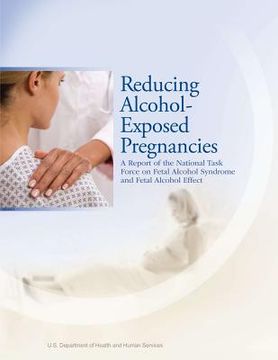Reducing Alcohol-Exposed Pregnancies: A Report of the National Task Force on Fetal Alcohol Syndrome and Fetal Alcohol Effect (en Inglés)
Reseña del libro "Reducing Alcohol-Exposed Pregnancies: A Report of the National Task Force on Fetal Alcohol Syndrome and Fetal Alcohol Effect (en Inglés)"
Alcohol misuse is a serious, worldwide public health issue that can result in a wide range of physical, psychological, and social problems affecting the individual, the family, and the community. Drinking alcohol during pregnancy increases a woman's risk of having a baby with birth defects and developmental disabilities. Alcohol consumption during pregnancy is recognized as the cause of fetal alcohol spectrum disorders (FASDs). FASD is a term used to define the spectrum of physical, mental, behavioral, and/ or learning disabilities that can result from prenatal alcohol exposure. Fetal alcohol syndrome (FAS) is one of the most severe outcomes of drinking alcohol during pregnancy and is characterized by facial malformations, growth deficits, and neurodevelopmental problems. Efforts have been underway for several decades to develop strategies to prevent alcohol-exposed pregnancies (AEPs) and reduce the risk of FASDs. In 2002, the National Task Force on Fetal Alcohol Syndrome and Fetal Alcohol Effect (NTFFASFAE), a federal advisory committee, released its first recommendations. Among these recommendations were several items focused on prevention, including recommending the reissuance of the U.S. Surgeon General's advisory on drinking during pregnancy [4] and the development of a report to review the evidence for effective prevention and treatment strategies for women at risk for or engaging in prenatal alcohol use. In 2004, after deliberations on and publication of Fetal Alcohol Syndrome: Guidelines for Referral and Diagnosis [5], the NTFFASFAE decided to focus its attention on FASD prevention. The Task Force Prevention Working Group (PWG) was established to guide the development of a report describing evidence-based prevention strategies to reduce AEPs and outline recommendations to further promote the implementation of such strategies. To accomplish this, the staff of the Centers for Disease Control and Prevention's (CDC) National Center on Birth Defects and Developmental Disabilities engaged the Community Guide Branch at CDC's National Center for Health Marketing and Research Triangle Institute International (RTI) to assist the PWG in this work. RTI conducted a systematic search of the literature to identify community-level FASD interventions and policies that can prevent alcohol-exposed pregnancies and reduce the prevalence of physical, mental, behavioral, and learning disabilities due to prenatal alcohol exposure. The review focused on community-level interventions and policies because other systematic reviews either have been completed or are currently under way to explore both clinical interventions and population-based strategies addressing alcohol misuse. For example, in 2004, the U.S. Preventive Services Task Force engaged in a systematic review that resulted in clinical recommendations on screening and behavioral counseling interventions in primary care settings to reduce alcohol misuse [6]. Also, the Task Force on Community Preventive Services, coordinated by CDC, is actively engaged in systematic reviews to assess the effectiveness of population-based alcohol prevention strategies that affect people in the general population, including women of childbearing age. This report reviews the current evidence on prevention strategies to reduce AEPs, provides recommendations on promoting and improving these strategies, and offers future research directions in the field of FASD prevention. This document also serves as a guide for those in the research and practice fields interested in selecting and implementing effective, scientifically tested interventions for women at risk for an AEP. In addition, the report also highlights the importance of continued collaboration across federal, state, and local agencies; academia; medical and social service delivery systems; and families to integrate scientific findings into public health prevention strategies.

